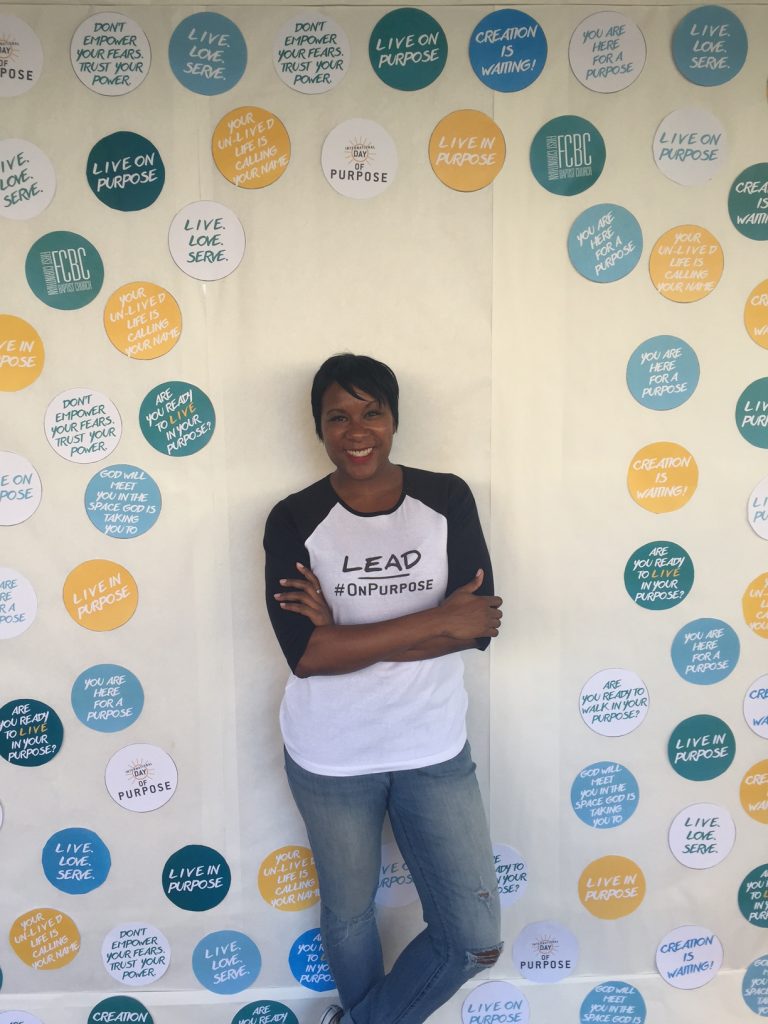
Jovian Zayne Irvin is the founder of the OnPurpose Movement, a consulting firm dedicated to helping organizations and individuals “Live on Purpose” through curated web content and in person training and facilitation experiences. Previously, she was a Managing Director of Talent Recruitment at Teach for America and a marketing professional at Black and Decker Corporation.
What were the key experiences in your life that influenced where you are today?
A key experience was growing up with two incredible parents who coached and supported me. There’s a saying, “Anyone who ever gave you confidence, you owe them a lot.” And I owe my parents everything. I learned from my parents to be the voice for others who don’t have a voice. They encouraged me to go down a path that others may be afraid to go down.
When I was younger I was told stories about the extraordinary choice my parents made to integrate schools. When my father was only fourteen-years-old he chose to integrate his school in South Carolina. My mother was part of a trailblazing group of women who helped to integrate Winthrop College. Their experiences taught me how to lead a life that’s legacy-leading and to provide a better life for other people. They ignited a passion in me to do things that were bigger than myself.
A huge moment for me was when I was the first black woman to be elected as Senior Class President at UNC Chapel Hill, and I’m still the only black woman who has held that position to this day. That was a pivotal moment when I recognized the power of my voice, and that I could be a uniting force across lines of difference. My peers wanted me to represent them and make things better for my class.
Another important experience was when I decided to move out of my marketing career into doing work that was more social justice based and people focused. I left Black & Decker and went to Teach for America. There I learned that I love to coach and help people be their best. This led me to create the business I run today.
What is the objective of your consulting business?
I, along with my partners, coach managers, deliver speeches, and develop curriculum and design work around professional development, management, branding, and diversity and inclusion. Some of our clients include Harvard University, The Clinton Foundation, The Aspen Institute, Janelle Monae’s Wondaland Records, and The Robin Hood Foundation. We love to help individuals and organizations live and work on purpose.

How can companies incorporate more meaning into the workday?
Organizations need to be clear on their intrinsic value and purpose. Why do they exist? What purpose are they serving? Why is their customer important? How does that drive how they want to serve that customer better? They need to understand the context in which they work.
Organizations need to clearly communicate this and more during their recruitment process. They should develop more nuanced and yet, direct job descriptions that mirror the impact they hope people will achieve in those roles. Too many job descriptions we see now are stale and fairly nondescript. They don’t necessarily communicate how the company wants employees to embody the values of the organization and bring their full selves to work. A person who is ready to work and live on purpose doesn’t want to have a disconnect between who they are outside of their 9-5 and during their 9-5. Organizations get the most out of their employees when they adapt jobs to let them shine.
What is the International Day of Purpose?
My organization founded the International Day of Purpose earlier this year out of a growing desire to shift the culture and the conversation around the power of purpose. As we work with clients to help employees and managers become more purposeful, and help organizations build core values and engage in one-on-one coaching, we realized that people are often floating through their lives without a clear sense of their “why.” People are living by accident. We asked, “What would happen if everyone in the world lived – not by accident – but on purpose?” We want people to be challenged by that question.
On the Day of Purpose we worked with multiple partners to give people opportunities to reflect on purpose, engage on purpose, and share on purpose. On our website there was a guide to help people participate in all three of these efforts. There were also events around the world where people could attend and participate in person.
There was a powerful social media component where people used the hashtag #dayofpurpose. People posted how they were living intentionally that day. We had 10 million people engaging in on-purpose behavior either online or attending events around the world from D.C., L.A., New York, Brazil, and Johannesburg.
Some of our partners included the White House Initiative on Educational Excellence for African Americans, KIND snacks, Big Brothers and Big Sisters of New York, The Clark Fox Family Foundation, Teach for America and Wondaland Records among others.

What are you short-term and long-term goals?
A short-term goal is building out more content to be delivered by the OnPurpose movement. For example, we’re hoping to get a recurring column in Forbes or another publication.
Our ultimate goal is for the International Day of Purpose to be recognized by the United Nations as an official day to be celebrated around the world. I’m also writing a book, The OnPurpose Manifesto that describes the stories of people who have been living on purpose, and also provides tools for others to do the same.
What is a meaningful life to you?
When you’re living on purpose, you’re constantly exploring your inherent purpose over time. An on-purpose lifestyle is activated with daily decision-making driven by a motivation to serve your purpose: who your friends are, where you eat, where you go, etc. The last piece is intention. You live intentionally and serve the world with your unique gifts and perspective.
What was your biggest career mistake?
There are two things I’d caution people against:
1) Do not let frustration in a job or frustrations with a manager stop you from showing up each day and being your best at work. Sometimes you’re frustrated and you check out. Don’t check out. It’s a decision you need to make for yourself – to be proud of your behavior and always be your best. I didn’t always do that and later I wish I would have.
2) Don’t stay in a position for too long when you know you’re not serving your purpose and serving the world. It’s hard to rebound after you’ve been in a job that sucks you dry. You know intrinsically it’s time to move on. Don’t wait for the fifteenth sign when you’ve already gotten four. Just go. Every day that you stay, you’re chipping away at your confidence.
What trends have you seen over time in the quest to have more meaning?
People don’t want to be bystanders. Millennials are also not driven by money or even comfort. They care more about doing work that matters; they care about recognition and professional development. The millennial generation makes up 25% of the workforce and by 2020 they will make up 50% of the workforce. That sheer fact demands that organizations adapt to allow people to be fulfilled through their work. They don’t just want to be fulfilled in their extracurriculars.

Who inspires you?
I’m inspired by Oprah. I’ve watched how she’s evolved, stood up in the face of challenges, and how she’s let’s herself be redefined by her own standard and not by someone else.
Miki Agrawal [fellow Forward Female], the founder of Thinx, is an inspiration. I admire her boldness. I’m attracted to people who are unashamed of being authentically themselves. As Miki becomes more famous she remains true to who she is. She is genuine.
What do you want your legacy to be?
I want to be known as someone who lives her life boldly and on purpose. I want to light the path for others. I want to be known as an encourager who has helped others to be their best.
